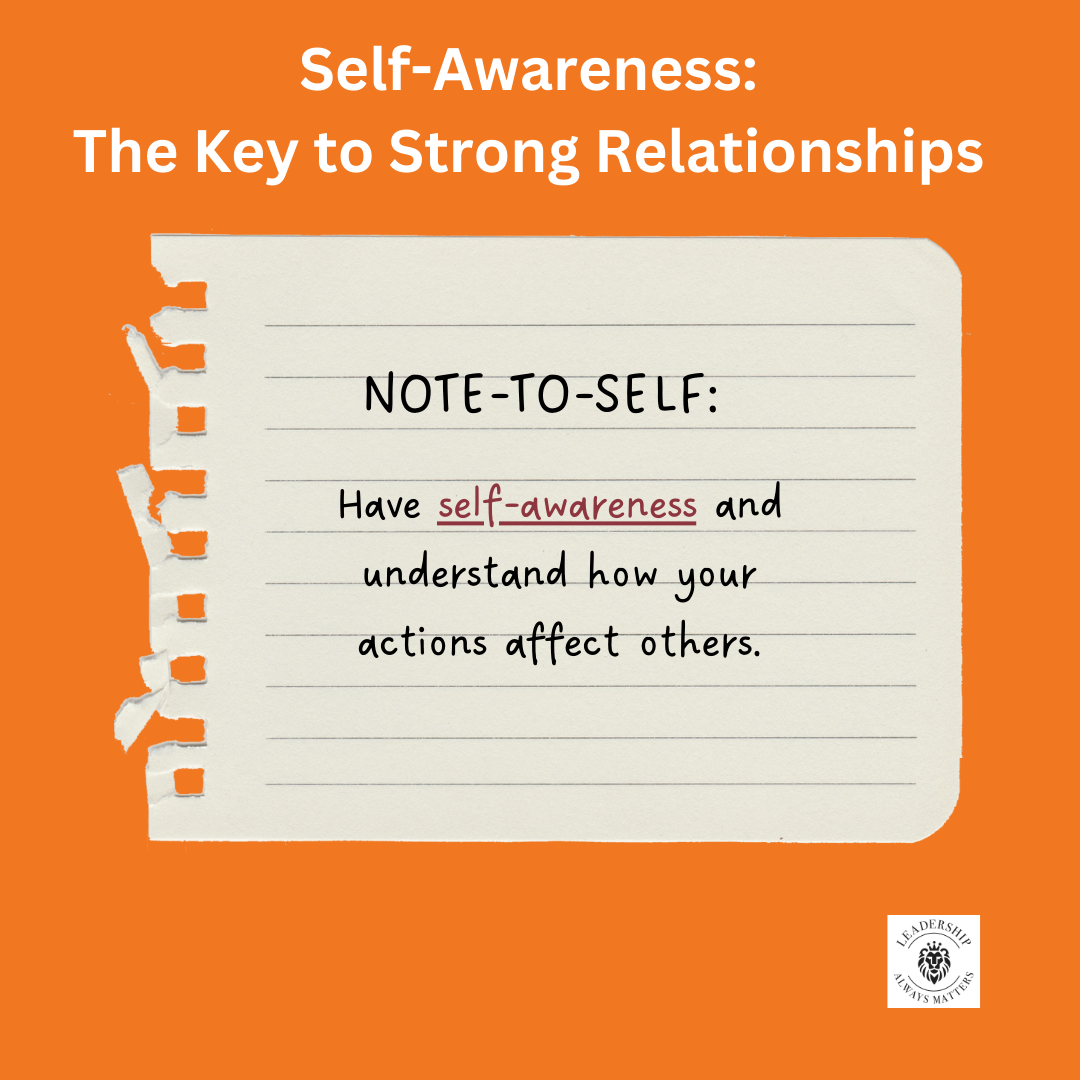Self- Awareness: The Key to Strong Relationships
Before we begin…
Although we’ve touched on self-awareness, I’ve elaborated in this article mostly because it’s a powerful leadership skill often underestimated, especially when it comes to relationships.
Let’s Talk Leadership!
Self-awareness is foundational for effective leadership. When you understand your own strengths, weaknesses, values, and biases, you lead more authentically and make decisions aligned with your principles. Self-awareness also allows you to recognize how you impact others, which helps in building trust and strong relationships.
Sometimes we alienate others —and don’t know why. With self-awareness you are more conscious of your interactions and how you make others feel. With self-awareness you adjust your communication, empathize with others, and handle feedback constructively. It’s crucial for your growth because if you know your blind spots you are more likely to learn and improve. Self-awareness is an essential leadership quality that supports everything you do—personal or professional.
How does self-awareness help me get along better with others?
Self-awareness plays a huge role when interacting with others. It helps you to understand how others see you, how you come across. When you’re aware of the impact your words or actions have, you can make adjustments to communicate in a way that fosters respect and trust.
With self-awareness, you’re more in tune with your emotions, reactions, and habits. You are able to control impulsive responses, express yourself clearly, and avoid projecting your own insecurities onto others. When you understand your own triggers and limitations, it’s easier to listen, respond thoughtfully, and be caring. It also naturally fosters authenticity. People are drawn to those who are grounded and authentic.
Do You Know…
It can be tricky to know if you come across as being “oblivious?” That is because you don’t see yourself the way others do? These are ways to identify if this is happening.
Reflect on Your Language. Think about your word choices and tone. Phrasing things in a way that seems overly formal, corrective, or condescending can give off a snobbish vibe, even if you’re just trying to help.
Notice Body Language. Your body language can reveal a lot. If others seem uncomfortable, avoid eye contact, or keep their responses short, it can be a sign they’re picking up on something they find off-putting or intimidating.
Look for Subtle Reactions. Pay attention to small reactions, like sighs, eye rolls, or pauses before people respond. If they often react this way, it may be a hint that they feel dismissed or talked down to even if it’s not intentional.
Observe Group Dynamics: If people don’t ask for your input or they hesitate before responding, it may mean they feel uncomfortable or judged. People who feel comfortable usually interact more freely.
Someone who lacks self-awareness is often described as being “oblivious, insensitive, or self-absorbed”— implying the person may not fully understand how their actions, emotions, or words affect others—or even themselves. In some cases, people might call someone “tone-deaf” if they frequently miss social cues or don’t notice they’re coming across negatively.
Have self-awareness.
Your actions affect others.
How can I increase my self-awareness?
There are techniques that help build self-awareness. Here are some that tend to be effective across different contexts:
Seek Feedback
Ask for honest feedback from trusted colleagues or friends. It gives you insight into how others perceive you. Sometimes our blind spots are most obvious to those around us, so their perspective is valuable for growth.
Mindfulness/Mediation
Practice mindfulness. It helps you tune in to your thoughts and emotions in real-time. Meditation builds the habit of observing your mental state, making it easier to recognize and manage emotions before they take control.
Set Intentions and Goals
Define personal goals and regularly review progress. It forces you to confront any gaps between what you say you’re gonna do and what you actually do. This is a practical way to hold yourself accountable and increase alignment between your values and behavior.
Practice Self-Questioning
Ask yourself, “Why did I react that way?” or “What am I feeling right now and why?” Take a moment to pause and question your responses. It helps build insight into your emotions and motivations.
Check In Daily
A quick self-check at the start or end of each day—focused on what went well, what didn’t and what you learned—helps you build awareness around the decisions you make and the effects they have on your well-being and relationships.
Each of these techniques works well on its own, but combining a few can help accelerate your growth.
Have a good weekend!
—-Dr. Aguilar

